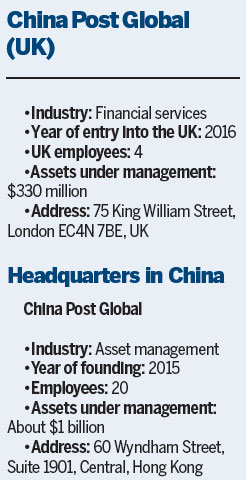New funds open door to investment

Takeover by China Post Global creates additional options for overseas investors by increasing exposure to A-shares
Danny Dolan still remembers the uncertainty faced by his colleagues when the Royal Bank of Scotland planned to cut its Market Access Exchange Traded Fund team 18 months ago. Rescue came when the fund was acquired by a Chinese investment fund, which has helped it thrive.
The acquisition gave China Post Global a solid foothold in the UK for the first time. Dolan, who is now managing director at China Post Global, is preparing the launch of two A-share-related exchange-traded funds later this year.
| Danny Dolan (right), managing director of China Post Global, joins a panel discussion at The Association of the Luxembourg Fund Industry conference in March. Provided to China Daily |
"We've always been a niche ETF provider, focused on emerging markets and commodities. This will continue going forward, with an additional focus on "smart beta" and Asia, to reflect our new ownership," Dolan says.
Dolan's old team headed the exchange-traded funds range of Royal Bank of Scotland. ETFs are financial products that essentially offer investors returns based on a basket of underlying products, such as stocks, bonds and commodities. The ETF arm of Royal Bank of Scotland had eight exchange-traded funds listed in Switzerland, which are now a part of the China Post Global basket of ETFs.
China Post Global's plans to launch A-share-related exchange-traded funds coincides with the announcement in June by the US index provider MSCI to include A-shares in its emerging market index.

The inclusion would mean Western asset management companies that track MSCI indexes in their investment strategies would also look to increase their exposure to A-shares. Those with more experience may invest directly in A-shares, but others new to buying Chinese stocks might prefer to buy overseas-listed ETFs with A-shares as underlying, which gives them more familiarity.
For this reason, many other funds have already launched A-share related exchange-traded funds in the UK and Europe. An example is one such index launched in January by GF Fund Management, China's sixth-largest asset manager, which is listed on the London Stock Exchange and has attracted $20 million in investment.
Perhaps China Post Global's unique position to unlock China opportunities for overseas investors is one of the factors that secured its successful bid for Royal Bank of Scotland's exchange-traded funds arm last year, especially considering it was competing with 14 other interested parties, including many existing ETF managers - US and Asian managers who wanted to establish a presence in Europe - and multiple private equity companies.
"Many types of institutions and locations wanted to acquire our business," says Dolan. Royal Bank of Scotland's ETF arm's board of directors picked China Post Global.
"China Post Global was a clear winner. Due to its scale, ambition and its institutional support, it stood out as the best candidate to take over the business, to retain the existing ETFs and attract further investment - including launching new ETFs," Dolan says.
China Post Global is a subsidiary of China Post Fund, an asset management company established in Beijing in 2006 as a joint venture between China Post Group, China's State-owned postal service, and two financial services companies, Capital Securities and Sumitomo Mitsui Banking Corp.
China Post Fund has $26 billion under management. In 2015, it decided to establish a new subsidiary in Hong Kong focusing on investment activities, which became China Post Global. China Post Global now has about $1 billion in assets under management, of which $330 million is managed from London.
Dolan says what makes China Post Global's London activities unique is his team's ability to create highly attractive exchange-traded funds by leveraging on its China headquarters strength.
The two China A-shares ETFs use what he calls "smart beta strategy", which is a method of picking stocks with small fluctuations in return, while maintaining strong fundamentals, such as return on equity, strength of balance sheet, profitability and stability of earnings.
He says that because these stocks have small fluctuations in return levels, they will be considered by investors as having relatively fewer risks.
"In Europe, there are many investors who want China exposure but are worried about volatility," he says.
This "smart beta" strategy is different from the more commonly used market capitalization weighted strategy that many other exchange-traded funds engage in, which gives more weight to larger stocks.

"This is a strategy tailored for European investors who want to invest in China, but only want exposure to the highest-quality companies. For example, they may not want an index weighted heavily toward financial stocks because of concerns about levels of bad loans," he says.
Dolan expects the two new exchange-traded funds to each attract 100 million euros in client assets within two years of launch.
To create diversification of stocks within these ETF products, each exchange-traded fund will contain around 150 to 170 stocks. Another added benefit of these ETFs is their denomination in renminbi, which will further help global investors diversify their assets and become more resilient to currency risks.
Dolan says the ETFs' renminbi denomination will also help their marketing and branding, since they essentially provide a "pure" exposure to China. "Also, we believe in the long-term resilience of the renminbi - due to the long-term strength of the Chinese economy, which is growing with strong fundamentals," he says.
The two A-shares exchange-traded funds will be listed in Frankfurt and Zurich, like the company's existing ETFs, but they will also be listed on the London Stock Exchange, "because the LSE is very keen to embrace China opportunities, and London is a key offshore renminbi hub," Dolan says.
Wang Cong, a professor of finance at China Europe International Business School, says China Post Global's strategy to launch A-share ETF products in London is timely, since the MSCI inclusion of A-shares will lead to a gradual increase of demand for A-share ETF products.
Wang adds that the "smart beta" strategy of China Post Global fits well into a trend of investors' preference. "Smart-beta ETFs are a halfway house between passive and active management, and the demand for such products has been growing," he says.
Active management normally means that investors select stocks by themselves, whereas passive management means tracking big portfolios. While active selection requires a high degree of familiarity with a market, the safer option of buying passive investment means that investors often receive lower returns than active investment.
A strategy that falls somewhere between the two is growing in popularity. Such a strategy is coherent with Dolan's vision to provide new products to London investors that fulfill a market demand.
"Rather than duplicate existing products already on the market, we try to identify problems facing our clients and provide investment solutions in ETF format," he says.
cecily.liu@mail.chinadailyuk.com
(China Daily Africa Weekly 08/18/2017 page30)
Today's Top News
- Chinese, Russian media outlets urged to enhance cooperation
- Where mobility will drive China and the West
- HK community strongly supports Lai's conviction
- Japan paying high price for PM's rhetoric
- Japan's move to mislead public firmly opposed
- Xi hails progress in Hong Kong, Macao































